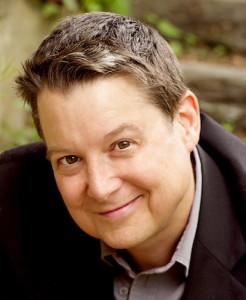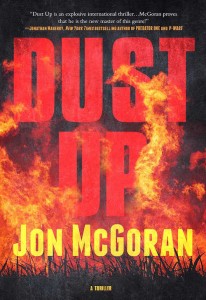 Jon McGoran is the author of six novels including the Doyle Carrick biotech thrillers Drift, Deadout, and the newest releases, the novel Dust Up, and the novella Down to Zero, all from Tor/Forge. Writing as D. H. Dublin, he is the author of the forensic thrillers Body Trace, Blood Poison, and Freezer Burn. He has written a number of crime, horror and science fiction short stories and novellas, as well as essays on food and agriculture.
Jon McGoran is the author of six novels including the Doyle Carrick biotech thrillers Drift, Deadout, and the newest releases, the novel Dust Up, and the novella Down to Zero, all from Tor/Forge. Writing as D. H. Dublin, he is the author of the forensic thrillers Body Trace, Blood Poison, and Freezer Burn. He has written a number of crime, horror and science fiction short stories and novellas, as well as essays on food and agriculture.
What made you decide to be an author?
I heard there was a dental plan. Actually, I always knew I wanted to be a writer. I wrote short stories as a child and an adolescent. I had a couple of mentors who helped me. (Shout out to my high school English teacher Irv Rotman!) Toward the end of high school I began to focus on writing and playing music, instead. I actually did that pretty seriously for about ten years. It wasn’t until I was about thirty that I seriously returned to writing fiction, and then I was only interested in novels. It wasn’t until after the D. H. Dublin books came out that I started writing short stories again, and I really do enjoy them. Novellas, too. I’ve written a handful of them, and I really enjoy that length.
Do you outline or fly by the seat of you pants?
I outline like a mug. I outline big time. I’m a big proponent of outlines, an outlining advocate, and now you’ve gone and asked me about it. Sometimes I actually write parallel outlines, for the plot and the revelation of the information or clues that lead to the solution of the riddle at the heart of the mystery or thriller. I find outlines indispensable for plotting, but I also find them hugely helpful with creating nuanced and believable characters who have a consistent internal logic and a concrete point of view. By the time I start writing the first draft, I know who is doing what, but more importantly why. I know my characters, I know what they would or wouldn’t do. I seldom have a character tell me they wouldn’t do what I need them to, because by the time I’m writing the draft, we’ve already talked it out. We have an understanding.
 What non-crime books do you enjoy reading?
What non-crime books do you enjoy reading?
I’ve been reading more science fiction, lately. I really enjoyed Margaret Atwood’s Maddaddam trilogy. They stayed with me a long time changed my thinking in ways. Right now I’m reading John Scalzi, and he is great. I like Paolo Bacigalupi. I’m also a bit of a news junkie, both politics/current events (partly because we’re living in crazy time) and science news, which I tell myself (only partially disingenuously) is about filling the well and thus, is important and work-related. I’ve also been reading a lot of middle grade and young adult fiction this past year, in a wide range of genres (including some crime fiction), and I have really enjoyed that.
What advice would you give to beginning writers?
I would say keep yourself open to constructive criticism, seek it out and take it to heart, but don’t take it personally. And even more importantly, I would say grab onto every bit of praise and take that to heart, too. It’s a tough business, so there is nothing wrong with wringing all you can out of what encouragement you receive. It might not mean you have arrived at your destination, but it means you’re not on the wrong path. Then I would say get rid of all that exposition and fix all those point of view errors.
How do you handle rejection or bad reviews?
If it ever happened to me I would probably deal with it through serious and complete denial. Seriously, though, it is hard. You put yourself out there so much, and so much of the time you get kicked in the teeth. It ain’t easy. That’s why, as I said, it’s important to hold onto the kind words and encouragement. You keep those with you, keep them in your pocket and take them out and look at them when some idiot fails to adequately appreciate your brilliance. And always have something else to focus on — another query or submission, another work in progress, something to focus on to keep you moving ahead. It also helps to have lots of writer friends who can commiserate with you and agree with you about that idiot who just rejected you (And yes, technically you were not rejected, one piece of your work was, but we all know that’s not what it feels like).
